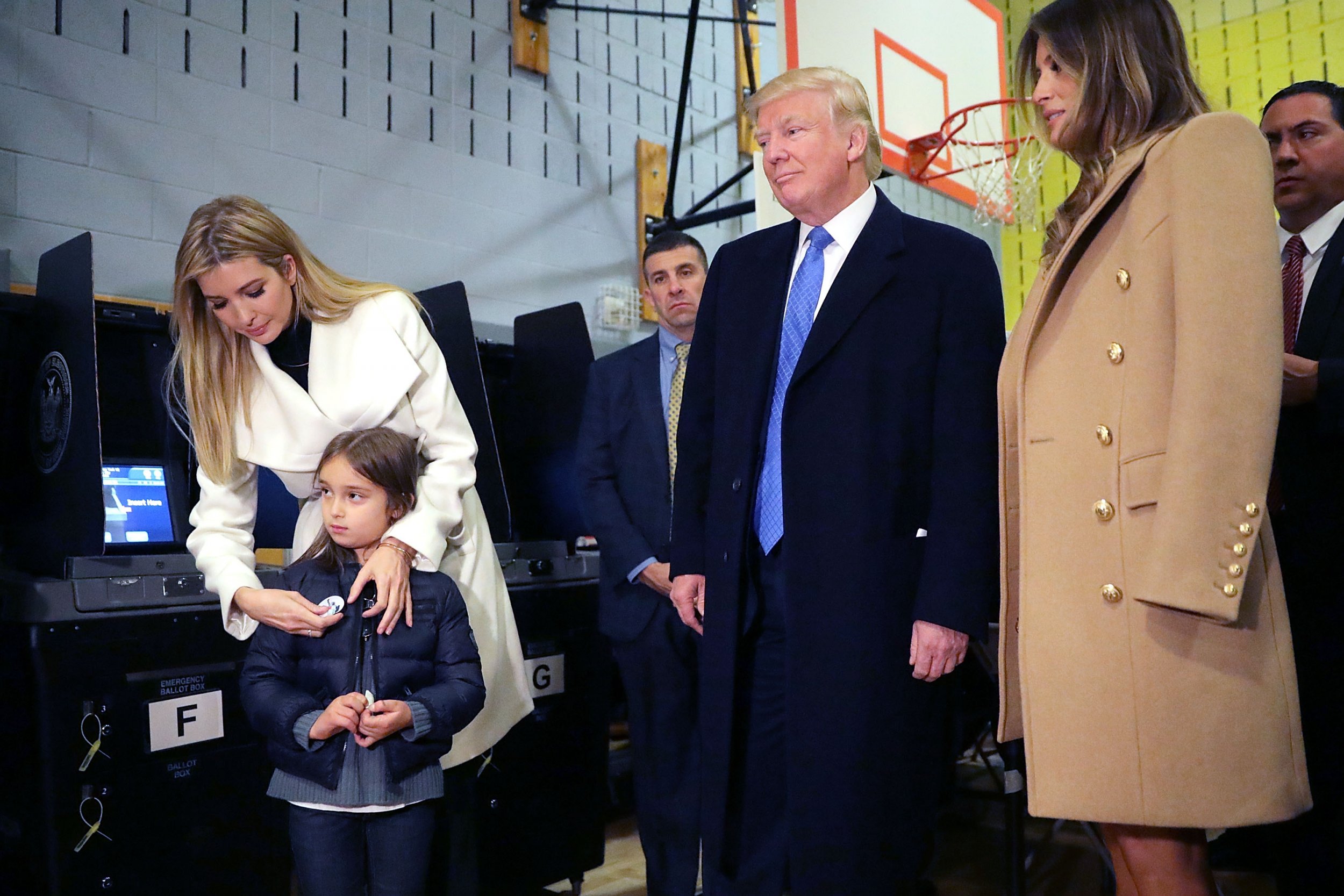
This article originally appeared on The Conversation.
Family is important to Donald Trump. The president-elect has appointed his son-in-law Jared Kushner as a senior White House adviser. For the duration of the presidency, the real estate mogul has handed over the reins of his company to two of his sons Donald and Eric (and the CFO Allen Weisselberg). His children have played important roles in the election campaign; in transition reviews of new appointments; and have even participated in meetings with foreign visitors.
By many accounts, the next generation of Trumps and in-laws are impressive.
Friends of mine at the General Services Administration, which manages government property, report that Ivanka Trump was universally regarded as thoroughly professional in all her interactions with GSA staff in the lease negotiations for the Old Post Office on Pennsylvania Avenue. But this new Trump hotel, in which foreign leaders have been choosing to stay, thereby profiting Trump enterprises, is a half-mile from the White House and epitomizes the conflicts of interest raised by Trump's presidency.
A clause in the lease that Ivanka Trump negotiated, for example, includes a standard provision in government contracts to prevent or limit conflicts of interests:
"No…elected official of the Government of the United States..shall be admitted to any share or part of this Lease, or to any benefit that may arise therefrom…"
So far, however, any conflict of interest problems have been brushed aside by Donald Trump.
So what might happen in a presidential democracy where the leader or those working for the leader are motivated by absolute personal or family loyalty and ignore legal requirements and procedural traditions?
As a comparative political scientist who studies different types of governments, I'm particularly interested in whether Trump's way of governing will fit into what we call "sultanism" where the rule of law, procedures and institutions are eroded by personal loyalties. Such a system, history shows, has eroded institutions and—in a democracy—could lead toward authoritarianism.
Let me explain.
What sultanism means
It was over a century ago that the famous political sociologist Max Weber developed the concept of sultanism, which, he wrote, "operates primarily on the basis of discretion."
"Sultans," or kings, of the Ottoman empire were absolute rulers, their power made legitimate by theology. They used arbitrary and despotic powers. Their lifestyles were lavish and decadent. And over time they lost their power. While rival European empires such as the Hapsburgs' Austro-Hungary and Weber's native Germany were rising in the 19th century as they developed impressive civil and military bureaucracies and procedures, the Ottoman Empire was declining.
The late Juan J. Linz and Alfred Stepan of Columbia University argued that sultanism is both a regime type (like democracy and authoritarianism) and an adjective describing a style of personal rule that is possible under all regime types, including democracy. They wrote:
"The essence of sultanism is unrestrained personal rulership…unconstrained by ideology, rational-legal norms, or any balance of power."
Sultanism, in other words, is most common under authoritarian and autocratic rule, but it can also be present in democracies, where leaders personalize decision-making instead of following established institutional or legal processes.
Some might assume it irrelevant to compare any U.S. leader to classic sultanistic rulers such as the Duvaliers of Haiti, Ferdinand Marcos of the Philippines or Joseph Stalin of the Soviet Union. These regimes were nondemocratic and dominated by a single personality with family members intensely involved.
However, like the U.S., South Korea is a democracy and its president, Park Geun-hye, was impeached Dec. 9 for corrupt activities, many connected to a close family adviser. The adviser, allegedly a shaman, is herself the daughter of another Rasputin-type religious figure who had also secretly advised the president's father during his 18 years in office.
Another example can be found in Nicaragua. President Daniel Ortega—who packed his Supreme Court to allow him a third consecutive term—has as his vice president his wife, Rosario Murillo, one of the few leaders he trusts, having alienated much of his party.
American precedents
It is also the case that the U.S. has had sultanistic tendencies of its own in the past.
President John F Kennedy's closest adviser and his attorney general was his younger brother Robert, indispensable during the perilous time of the Cuba Missile Crisis. And JFK, while in office and sometimes with his brother Robert involved, took enormous risks in having flings with women with dubious political connections—from a socialite with links to the mob to a possible East German spy. This is not mere indiscretion.
The reaction of Congress to all this was to pass, in 1967, the Anti-Nepotism Statute—nicknamed the "Bobby Kennedy Law"—to make sure close relatives no longer assume official positions. Some suggest, however, that the law does not exclude unofficial advisers.
Another example of sultanistic practices include Hillary Clinton, who was her president-husband's lead and unpaid adviser on health care reform.
And then, in George W. Bush's Cabinet, the two most powerful foreign policy advisers—Defense Secretary Donald Rumsfeld and Vice President Dick Cheneys—were both alumni of George H. W. Bush's administration. After the terrorist attacks of 9/11, Rumsfeld and Cheney, with Bush's approval, established arbitrary policy that permitted torture, warrantless surveillance and targeted assassinations.
These Bush-era "law-free" zones in national security matters, which some have called dictatorial, were based on the legal concept of the "unitary executive." The idea is that the judicial and legislative branches cannot check or regulate the president on "executive" matters, especially those involving national security.
The unitary executive in turn facilitated sultanism by asserting that the president monopolizes all executive power, however exercised. As some noted constitutional scholars have said, this theory basically places the president above the law.
What makes Trump different
Modern American presidents have risen through the institutions of U.S. democracy—state political parties, Capitol Hill, the military. They have been vetted and embedded in institutional rules, attitudes and relationships. Someone coming in "from the cold," in contrast, brings his family and close associates and makes decisions outside of those formal and informal institutions.
Having masterminded his unexpected victory based on an unconventional campaign, Trump has already shown a tendency to trust his instincts on major decisions of governance, creating impulsive, unpredictable decisions. His past record as CEO and his outsider status make Trump self-reliant and assured that most of the world is misguided and only he and his few trusted advisers, including his family, have the answers.
When questioned, for example, on his pledge to ban Muslims from entering the country "until our country's representatives can figure out what is going on," Trump said:
"What I'm doing is no different than FDR. If you look at what he was doing, it was far worse … and he's one of the most highly respected presidents — they name highways after him."
Here Trump was evoking the 1944 Korematsu decision, which upheld almost unlimited executive powers over immigration to permit the detention of Japanese-Americans without any evidence (and none existed) of subversion. This decision is considered by many constitutional scholars as the most ignominious in Supreme Court history, a "tragic mistake that we should not repeat." Even the late Justice Antonin Scalia disavowed it.
The U.S. presidency has always been prone to sultantistic tendencies, but under a Trump presidency what were once isolated incidents could become a way of governing. When the closest advisers, both institutional (in the case of son-in-law Jared Kushner) and informal (in the case of his three children), are dominated by family members, the decision-making process will not only be influenced by private family interests but also tend to ignore legal procedures.
Instead of a "team of rivals"under the rule of law, the Trump presidency may be akin to medieval monarchy, with decisions made by court politics, not legal procedures.
Henry F. (Chip) Carey is associate professor, Political Science, Georgia State University.
Uncommon Knowledge
Newsweek is committed to challenging conventional wisdom and finding connections in the search for common ground.
Newsweek is committed to challenging conventional wisdom and finding connections in the search for common ground.
About the writer
To read how Newsweek uses AI as a newsroom tool, Click here.








